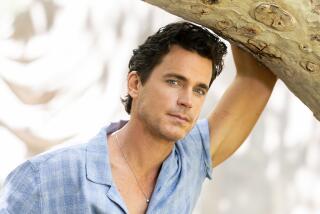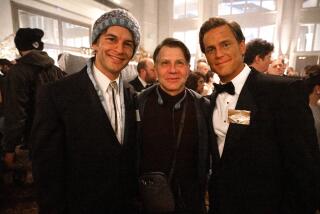Love and faith in conflict
- Share via
Screenwriter C. Jay Cox (“Sweet Home Alabama”) makes a heart-wrenching directorial debut with “Latter Days,” which will surely rank among Outfest’s strongest offerings. It’s an all-stops-out heart-tugger for sure, but its emotional wallop is earned honestly and uncompromisingly. Written and directed with a clear sense of commitment by Cox, it affords rich roles for young actors Wes Ramsey, Steve Sandvoss and Rebekah Jordan as well as those accomplished risk-takers, Jacqueline Bisset and Mary Kay Place.
Ramsey’s Christian is a WeHo party boy who, along with his neighbor Julie (Jordan), an aspiring singer, works for Bisset’s wise Lila, the proprietor of an elegant restaurant. Most of her waiters and waitresses pursue show-biz dreams, but having a good time seems uppermost in Christian’s mind. So when he acquires four young Mormon missionaries as neighbors, he thinks nothing of accepting a $50 bet that he can seduce sweet-natured, boyish-looking Davis (Sandvoss), one of the missionaries. He discovers that Davis is secretly gay and attracted to him but no pushover, confronting Christian with his shallowness.
Thus begins a great awakening for both young men. Christian realizes that what Davis has said about him is true, and he embarks upon a personal transformation. In the process Christian realizes he loves Davis, whose religion regards homosexuality as anathema and who struggles mightily with his growing feelings for Christian. There is no escaping that the two face a hard path regardless of what happens. Place plays Davis’ mother, for whom the notion of Christian charity has no meaning.
In expressing genuine respect for Davis’ spirituality, Cox opens up the contradiction between faith and doctrine that seems to many gay people the near-universal affliction of organized religion. What develops is enough melodrama for a Douglas Sirk movie, but like Sirk, Cox knows how to make these elements work in telling a sweepingly romantic story.
Louise Hogarth’s urgent and incisive “The Gift” destroys the illusion far too many gay men hold that AIDS has now become such a manageable disease that unsafe sex is an option -- and that’s just the beginning. Hogarth introduces us to one young man whose Web site promotes unsafe sex parties and even “conversion” parties for those who, like himself, want to get infected and “not worry about it anymore.” By the time Hogarth finished post-production, she reports, he was no longer well enough to keep up his Web site.
In showing a discussion among four middle-aged, HIV-positive men, all of them having suffered horrendous side effects from their drugs, Hogarth learns from them and others how HIV status has proved deeply divisive in the gay community. She finds that AIDS prevention promotions have largely failed, in part because they have been overly sensitive to HIV-positive men and not sufficiently emphasized the value of HIV-negative men. She also discovers the lethal interplay of ignorance, denial, guilt and social pressure in the spread of AIDS.
She leaves us with a roster of terrifying statistics, starting with the statement that as far back as March 1996, at least two teen-agers have been infected with HIV every hour, every day, in the U.S., and ending with the prediction that in two years nearly half of San Francisco’s HIV-positive people are expected to exhibit resistance to HIV medications.
When he was growing up in an upscale Encino cul-de-sac, Darren Stein was, from age 8, the neighborhood video auteur, directing himself and his playmates in more than 50 mini-genre movies. At the suggestion and with the assistance of childhood pal Adam Shell, Stein has made a delightful and revealing documentary, “Put the Camera on Me,” in which Stein and Shell interweave clips from the videos with interviews with the others who participated as children and some of their parents.
What emerges is a portrait of happy, healthy kids acting out mainly horror and action vignettes with Stein, who was a little older than the rest and by far the most dominant personality, creative and forceful. The videos capture power plays among the kids and, perhaps most significantly, Stein discovering ways to express his gay sensibility. “Put the Camera on Me” shows that Stein was a natural storyteller, and, indeed, he has grown up to be a filmmaker, with two features to his credit and more on the way.
*
Screenings
“Latter Days”
8:30 p.m. tonight, John Anson Ford Amphitheater, 2580 Cahuenga Blvd. East, Hollywood.
“The Gift”
Noon Saturday, Directors Guild of America, 7920 Sunset Blvd., Hollywood.
“Put the Camera on Me”
3 p.m. today, the Village at Ed Gould Plaza, 1125 McCadden Place, L.A., and 7:30 p.m. Saturday at the DGA.
Info: (213) 480-7065 or www.outfest.org/fest2003/
More to Read
Only good movies
Get the Indie Focus newsletter, Mark Olsen's weekly guide to the world of cinema.
You may occasionally receive promotional content from the Los Angeles Times.










